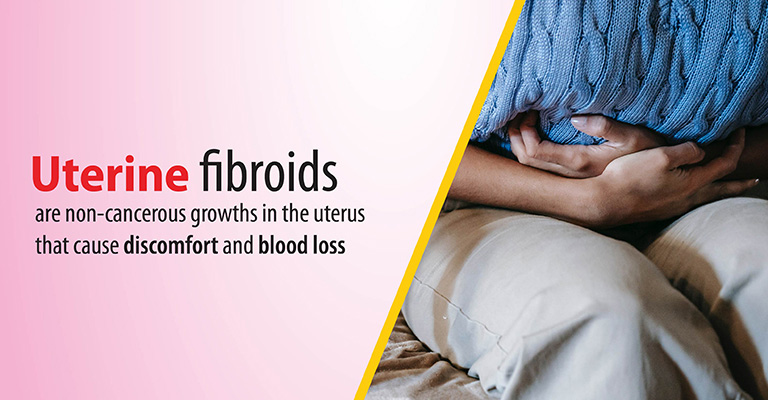
Uterine fibroids are non-cancerous growths in the uterus which can cause discomfort and blood loss, but aren’t usually dangerous. It can, however, lead to anaemia, fatigue and in rare cases, a blood transfusion might be required. These growths are not linked to an increased risk of uterine cancer.
These fibroids, which appear during childbearing age, can be multiple or sometimes there can even be a single growth, often not manifesting in any discernible symptoms. The doctor would typically detect uterine fibroids during a pelvic examination or prenatal USG.
What are the common symptoms of uterine fibroids?
While many women don’t feel any symptoms at all, some of the known symptoms, which depend on location, are:
- Heavy periods
- Periods stretching beyond a week
- Pain or feeling of pressure in the pelvic region
- Frequent urination
- Difficulty passing urine
- Constipation
- Pain in the back or legs
- Pain during sexual intercourse
You should see a doctor immediately if pelvic pain or heavy, prolonged periods persist.
Are there known factors causing uterine fibroids?
While the exact causes of uterine fibroids are not known, doctors can list certain factors from their clinical experience. These include:
- Genetic alterations: Changes in genes in uterine muscle cells have sometimes been linked to uterine fibroids
- Hormonal issues: Progesterone and estrogen, which stimulate development of the uterine lining during periods, sometimes could promote growth of fibroids
- Other growth factors: Some substances that help the body maintain tissues, could also affect fibroid growth
- Extra-cellular matrix: ECM binds the cells together and is increased in fibroids. It also causes biological changes in cells.
There are very few known risk factors for developing uterine fibroids except being a woman of reproductive age and having a family history of uterine fibroids.
Is there a heightened risk related to pregnancy due to uterine fibroids?
Normally, fibroids don’t affect the chances of conception. However, certain types of fibroids, particularly, submucosal fibroids, could lead to infertility and loss of pregnancy even, according to doctors. Fibroids could also elevate the risk of certain pregnancy-related complications like preterm delivery, placental abruption or impeding fetal growth.
How are uterine fibroids treated?
Small uterine fibroids most often don’t require treatment, while larger fibroids are treated with medicines or surgical procedures. Treatment will depend on the size, number and location of the fibroids and the symptoms.
Medicines:
- Pain medications: Over-the-counter pain medications like ibuprofen and acetaminophen can help manage pain and discomfort
- Iron supplements: If the fibroids are causing anemia from excess bleeding, you might be prescribed an iron supplement
- Birth-control options: Contraceptive pills, intravaginal contraception or other birth-control methods are sometimes used to control symptoms like heavy bleeding
- Gonadotropic-releasing hormone agonists: These medications are sometimes used to shrink the fibroids and can be administered through a nasal spray or injection
- Oral therapies: A relatively recent oral therapy is Elagolix, which is used to manage heavy uterine bleeding
Surgery:
Doctors normally use the procedure of myomectomy to remove the fibroids without damaging the uterus. The different methods of myomectomy are:
- Hysteroscopy: This minimally invasive procedure uses a scope to cut away and remove the fibroids
- Laparoscopy: This technique also uses a scope, but entails making a few small incisions in the abdomen
- Laparotomy: This procedure involves a larger cut to remove the fibroids
When future pregnancy is not planned, there are other modes of abdominal surgery like:
- Hysterectomy: Total removal of the uterus
- Embolization: This involves blocking the flow of blood from the uterine artery to the fibroids to shrink the fibroids
- Radiofrequency ablation: Alleviates symptoms and is delivered by laparoscopic, transvaginal or transcervical routes.
Medica Siliguri’s Department of Gynaecology provides complete diagnostic and treatment facilities under specialists for management and treatment of uterine fibroids, along with related complications.


